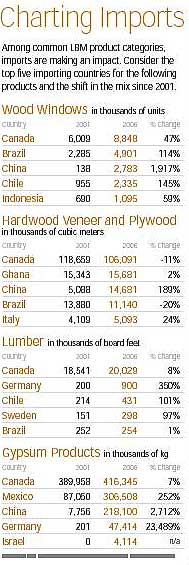Tips for Dealing With Importers
Consider following this advice when approached by or considering a deal with a building materials importer:
- Ask about lead time; shipments of custom-ordered, value-added products from China and other overseas markets might require up to 10 weeks of production and shipping time.
- Investigate the manufacturer, if possible, or at least get assurances of the importer’s quality-control processes.
- Demand samples of the product(s) being pitched and compare their quality with your existing sources.
- Conduct a test (or two) with a trusted customer to evaluate the process, quality, and promises made by the importer.
- Look for a track record by the importer and/or the product in other markets.
–Rich Binsacca
Getting Tough on Timber
A proposed federal law aims to stem the importation of illegally harvested timber.
A bipartisan bill in Congress, introduced in March, would more strictly regulate timber imports to ensure logs, raw timber, and even finished wood products are harvested according to federal law. The Legal Timber Protection Act (H.R. 1497), if passed, would require measures such as chain of custody or similar assurances of the wood’s origin and adherence to sustainable timber harvesting practices.
“Responsible businesses will now be protected from the costs of the illegal timber trade,” said Rep. Earl Blumenhauer (D-Ore.), a co-sponsor of the legislation, in a recent statement. He cites statistics from the American Forest & Paper Association that U.S. wood products companies lose $460 billion in annual sales to illegally harvested timber; in most cases, such timber is cut from unregulated forests in Southeast Asia, the Amazon River basin, Africa, and Russia, shipped to China and other manufacturing hubs, and then exported to the U.S. as finished wood products–including building materials, such as flooring.
The inability to track a product’s chain of custody, unless certified by such groups as the Forest Stewardship Council, not only creates unfair competition, says Blumenhauer, but also undermines the efforts and policies of U.S. importers and domestic suppliers regarding sustainable timber purchasing practices. Currently, it is not against the law for domestic importers and suppliers to receive illegally harvested timber; the new law would empower the Justice Department to sue those who bring illegal timber into the U.S. or ship it across state lines. For more information and to track the bill’s progress in Congress, go to http://thomas.loc.gov and search H.R. 1497.
–Rich Binsacca



